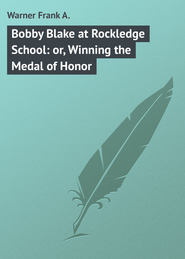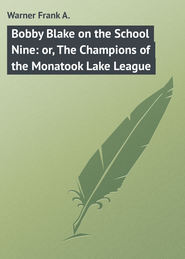По всем вопросам обращайтесь на: info@litportal.ru
(©) 2003-2024.
✖
Bobby Blake on a Plantation: or, Lost in the Great Swamp
Автор
Год написания книги
2017
Настройки чтения
Размер шрифта
Высота строк
Поля
“I wouldn’t be surprised,” whispered Bobby. “Maybe it’s the mate of the one that we killed to-day. She may have tracked us to get revenge.”
“I’ll bet that’s just what it is!” cried Fred. “Suppose we had had to sleep in the woods to-night. We’d be goners, sure.”
The others nodded, and they all three listened to see what the night prowler would do next. The brute examined every foot of the roof, and the boys could hear it sniffing suspiciously at the chimney. They blessed the man who had constructed the cabin with such a wary eye for such contingencies, and congratulated each other on being safe within instead of out in the woods and practically at the mercy of the savage brute.
The beast overhead finally seemed to come to the conclusion that it could not get in from the roof, and it leaped to the ground and the boys could hear it going away. For a long time they listened for it to come back, but it did not, and at last, far away, they heard the same wild scream they had heard while on the island in the swamp, but this time there seemed to be a note of grief as well as ferocity in the cry. It rose, cut wailingly through the darkness, and then died away.
For a long time the boys sat tense and expectant, not knowing at what moment the beast might return. But as nothing further happened, drowsiness at last overcame them, and after throwing a fresh supply of fuel on the fire, they dropped off into deep slumber, from which they were only awakened by a golden shaft of sunshine that pierced in through one of the little windows.
“Gee,” said Bobby, sitting up and rubbing the sleep out of his eyes, “I feel fit for anything now, and hungry enough to eat nails. It’s your turn to cook, Fred. Hustle around and see if you can get breakfast as well as I got supper last night.”
“Huh! I’ll show you what real cooking is like,” said Fred, leaping out of his bunk. “What shall it be – humming-birds’ tongues or bird’s-nest soup?”
“I think I’d rather have some bacon, if it’s all the same to you,” said Bobby, with mock seriousness. “There’s a fresh jar of it in the closet.”
“Oh, well, if you’d rather have ordinary, everyday bacon,” said Fred, “I’ll have to give it to you, I suppose,” and he soon had some appetizing slices sizzling in the pan.
“That cougar last night seems like a bad dream now,” remarked Lee. “I don’t mind admitting I felt mighty nervous while he was prowling around.”
“I guess none of us exactly enjoyed it,” returned Bobby. “But it may not have been a cougar at all. Maybe it was only a wildcat.”
“Possibly,” said Lee, doubtfully, and Fred terminated further discussion at this point by serving out the crisp bacon, together with some hardtack that he had fried in the grease. This was soon eaten, and after Fred had been complimented on his cooking, the boys cautiously unfastened the door, and, seeing no signs of the beast, whatever it was, that had disturbed them the previous night, ventured forth to explore their surroundings.
CHAPTER XXVII
THE MOCCASIN SNAKE
The hearty breakfast and the bright sunshine, added to the consciousness that they had found a shelter to which they might retreat in case of need put new zest into the boys, and they felt much more hopeful and lighthearted than they had twenty-four hours earlier.
“Somehow I have a hunch that this is going to be a lucky day for us,” remarked Bobby, as he led the way.
“Here’s hoping that you’re right,” said Lee. “We’re certainly about due for a change in fortune. Poor mother!” he added, anxiety coming into his eyes, “she must be worried to death. It’s safe to say she hasn’t slept a wink since we’ve been gone. I’ve no doubt she has searching parties out looking for us, but in this swamp they might hunt for days without coming across us.”
“We’ll trust in Bobby’s hunch,” Fred encouraged him. “They’ve often come out all right. I think he’s got a rabbit’s foot hidden about him somewhere.”
“If I had, we’d been out of this swamp long before this,” laughed Bobby. “Now,” he went on, “there’s one thing we’ve got to do, and it’s more important than anything else. Wherever we go, we’ve got to know how to find our way back to this cabin. In the first place, it’s the only safe place to spend the night. Then the very fact it’s here shows that parties come to it sometimes and we may have the luck of falling in with them.”
“Yes,” said Fred, “that’s good advice. But how are we going to do it?”
“By using this,” replied Bobby, showing him a small hatchet that he had fastened to his belt. “I found this in one corner of the cabin this morning and I brought it along. We’ll chip off pieces of bark from the trees as we go along and that will help us to find our way back.”
He illustrated this by slashing a bit of bark off a tree that they happened to be passing.
“That’s bully,” said Lee, greatly relieved. “I was just worrying about the chance of not being able to find our way back again.”
They went on, looking carefully for some sign of a trail, by following which they might again reach the plantation and friends.
Soon they found themselves on marshier ground than that near the cabin, and they turned in another direction to find better footing.
The ground was covered with rotting leaves and bits of broken branches. Fred was picking his way, and was just about to step on what seemed to be an unusually thick stick, about three feet long, when there was a warning shout from Lee who was several feet in the rear.
“Look out, Fred!” he yelled. “It’s a snake, a moccasin!”
The warning came too late. Fred’s foot had already touched one end of the seeming stick. Like lightning, an ugly head upreared at the other end and struck savagely at the intruder.
“Run!” shouted Lee. “Run for your life!”
Fred obeyed and ran as fast as the marshy nature of the ground permitted. The snake pursued him gliding through the tussocks, his baleful eyes like two flaming points.
Bobby had turned at Lee’s cry, and in a moment had grasped the situation. He had the hatchet in his hand and threw it with all his might at the snake, that was now close on Fred’s heels. He had no time to take careful aim, but by great good fortune the sharp blade struck the reptile a little behind the neck. It stopped instantly and writhed about, beating the ground and hissing horribly.
Lee in the meantime had picked up a club, and with a few blows from this put an end to the snake. Then he and Bobby hurried to their comrade, who had seated himself on the trunk of a fallen tree, pale and panting.
“Did he bite you, Fred?” cried Bobby, his heart convulsed with fear for his chum.
“I’m afraid he did,” replied Fred, in a tone that he tried to keep firm. “He gave an awful dig at my foot.”
In a moment Bobby was on his knees and was taking off Fred’s shoe. There were tiny holes in it where the snake’s fangs had penetrated. The stocking too was torn, and Bobby’s heart sank as he stripped it off.
But a great wave of thankfulness swept over him when he saw that the skin was not broken. He looked it over most carefully, but there was not even a scratch. By the narrowest of chances, Fred had escaped. His stout shoe had saved him.
“You’re all right, old boy,” said Bobby, though his voice trembled. “That snake came mighty near doing for you but didn’t quite make it.”
Fred almost collapsed as he realized that he was safe, for he had feared the worst.
“If he had struck above the shoe top it would have been good-night,” said Lee, who shared to the full the joy and relief of his friends. “Those moccasins are the deadliest snakes of the South. People are more afraid of them than of rattlesnakes. A rattlesnake will give warning, but a moccasin never does. Then too a rattlesnake is only too glad to get away from you if you will let him, but the moccasin will chase you, just as this one did. My, but you had a narrow escape. The snake was gaining on you and would have wound himself around your leg in another minute and then it would have been all over with you.”
Bobby brought a little water from a pool near by and carefully washed the stocking, scrubbing the shoe also, to remove any trace of the poison that there might be on them. Then after they had partially dried, Fred put them on and they all went over to look at the hideous reptile. It lay perfectly still and there was no doubt that it was dead, but to make assurance doubly sure, Bobby recovered his hatchet that lay a few feet away and with one stroke struck off the moccasin’s head.
“Gee, he’s an ugly looking sinner,” murmured Fred.
“Sure is,” agreed his chums in unison.
CHAPTER XXVIII
A GREAT DISCOVERY
Now that the snake was certainly beyond the possibility of doing them further harm, the boys could inspect it at their leisure. But even in death the venomous reptile inspired them with horror. Fred shuddered as he looked at him and thought of what might have been if the snake had struck a little harder or had overtaken him in that desperate chase.
It was about a yard in length, and the body was strong and thick. The short tail was provided with a row of shields and there was a horny appendage at the end. The long triangular head had shallow pits on the nose and the mouth was very wide. The color was a coppery brown and there were reddish brown bands on the sides that became wider on the lower end of the body, giving an appearance something like moccasins, and from these the snake derived its name.
What the boys specially noticed was a white band that ran round the creature’s mouth.
“That’s what gives it the other name it’s known by,” explained Lee. “People call it the cotton mouth, because that white streak looks like cotton.”
“It’s the ugliest thing I ever saw!” exclaimed Fred. “I only hope I never see another. You bet that I’m going to watch my step for the rest of the time we’re in this swamp.”
“Once we get out of this, you’re not likely to see one again,” Lee assured him. “They’re mostly found in wet, marshy places and I’ve never seen one on dry parts of the plantation. There are plenty of them in the low-lying rice fields, and the darkeys stand in deadly fear of them.”







